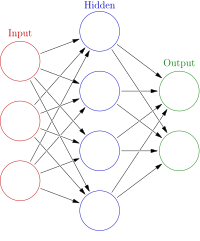
Photo from wikipedia
In recent years, advancements in machine learning (ML) techniques, in particular, deep learning (DL) methods have gained a lot of momentum in solving inverse imaging problems, often surpassing the performance… Click to show full abstract
In recent years, advancements in machine learning (ML) techniques, in particular, deep learning (DL) methods have gained a lot of momentum in solving inverse imaging problems, often surpassing the performance provided by hand-crafted approaches. Traditionally, analytical methods have been used to solve inverse imaging problems such as image restoration, inpainting, and superresolution. Unlike analytical methods for which the problem is explicitly defined and the domain knowledge is carefully engineered into the solution, DL models do not benefit from such prior knowledge and instead make use of large datasets to predict an unknown solution to the inverse problem. Recently, a new paradigm of training deep models using a single image, named untrained neural network prior (UNNP) has been proposed to solve a variety of inverse tasks, e.g., restoration and inpainting. Since then, many researchers have proposed various applications and variants of UNNP. In this paper, we present a comprehensive review of such studies and various UNNP applications for different tasks and highlight various open research problems which require further research.
Journal Title: IEEE Transactions on Pattern Analysis and Machine Intelligence
Year Published: 2022
Link to full text (if available)
Share on Social Media: Sign Up to like & get
recommendations!